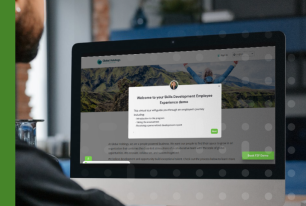The Power of Purpose and How It Can Build a Bridge
The role of purpose in aligning individuals and organizations in uncertain times.
Share
In my family, I am the oldest of four girls. Looking back, having this role always gave me a real sense of purpose. Going first meant paving the way – collecting my youngest sister from school and preparing a culinary delight for her tea (mainly involving oven-baked potato products) and working hard to achieve good results at school and college (perhaps spurred on through sibling rivalry). As the eldest, I had a clear role: To shape the path forward, to care for my sisters, and to keep them safe. I had a sense of responsibility for contributing towards our future and I felt stronger and more driven because of it.
There are several other phases in my life where I felt a stronger sense of purpose. In the year before my wedding, I found I could eat more healthily and find time to exercise. It was amazing how that goal gave me the drive to maintain focus and discipline for a consistent period (perhaps like a sports professional in training for a key event!) Later, when I was pregnant with my daughter, I felt incredible focus and contentment. My core purpose to protect and grow this new life, and that immense urge continued when she was born – another being, completely dependent – everything else suddenly irrelevant.
There have also been periods where I have felt a loss of purpose, or conflict, as my drivers misaligned with others. This resulted in feelings of discomfort, tension, and confusion. Many individuals have undoubtedly experienced this recently, as the pandemic alters roles in families through disrupting our health, employment, and family life.
What Is Purpose?
Some features such as core motivators, values, and beliefs may remain consistent; whilst others may oscillate based on life stages or contexts.
As a baby, we have one real purpose: To survive and grow. As we grow older, our main purpose transforms into learning and building friendships. My daughter is now almost five and started school in September. Like every other five-year-old, her memory for details and experiences is extraordinary; and so is her stubbornness when we eagerly ask her what she got up to today and hear her infuriating response:” It’s a secret!”. Then, the teenage years, as we journey through a quest for independence and identity. This is followed by our working lives where we start the lengthy juggling act of work and life – funding our lives, supporting families, and simply finding ways to sustain. Throughout our life phases, we always search for a sense of belonging, warmth, and acceptance with our families and close friends.
Perhaps these feelings of connection and meaning stay with us – like layers of an onion; there but not always exposed. Life isn’t linear. Therefore, we call upon the feelings of childhood when learning, showing curiosity, looking for ways to embark on new chapters in our careers, or even ‘rebelling’ – as we might have done as teenagers when life takes an unexpected twist or turn (how often have you admired those brave enough to throw in the towel and start again? Running an Air BnB in the Welsh countryside, escaping the rat-race).
We call upon the feelings of childhood when learning, showing curiosity, looking for ways to embark on new chapters in our careers, or even ‘rebelling’.
The Pursuit of Purpose
For centuries, many have written about purpose: What it means; how to find it; and why, as humans, we need it. Freud famously wrote: “What decides the purpose of life is simply the pleasure principle”. The id, according to Freud, is the driving force of human behavior – guiding the pursuit of pleasure, governed mostly by the ego and super-ego to keep instincts socially acceptable. Purpose is also discussed in Maslow’s hierarchy of needs, suggesting we only reach ‘all that we can be’ or self-actualization, when each rung of the ladder has been met.
Maslow’s theory has felt more vivid this year especially. Most of us are forced to think about our physiological needs and how we will access critical supplies; our safety needs – health and employment compromised; and love and belonging – our connections with friends and families – restricted. When we have choices taken away and are forced to focus on the basics, reaching the levels of ‘esteem’ (self-esteem, recognition, strength and freedom) and self-actualization (being the most that you can be) feels somewhat unobtainable.
And yet, finding purpose and meaning is more important for many individuals and organizations than ever before, perhaps because of this leveling experience and a compelling drive to contribute to our society in a meaningful, sustainable way. Dan Pink and Simon Sinek have heralded the importance of a galvanizing purpose for individuals at work for many years, and for good reason. A recent McKinsey study revealed that people who have a strong sense of purpose are 5 times more likely to report higher levels of well-being. They are at 15% lower risk of dying, and at work, are 4 x more likely to report higher levels of engagement and to help the organization deliver higher EBITDA margins.
Strikingly, another study showed employees report 33% higher levels of motivation when profit is not the primary concern.
The message is clear — Individuals need to feel meaningful purpose throughout their lives, and organizations that provide the environment to enable this will thrive across the longer term.
But how can organizations – often with thousands of employees – land upon a purpose that appeals to everyone, and at multiple life stages?
That is probably impossible. But what is achievable is an organizational purpose with meaning beyond profits to broader impact — empowering employees to interpret and own their mission in a personalized way. When this is combined with an understanding of individual drivers and motivations, the results can be powerful for everyone. That is when purpose can build a strong and sustainable bridge between individuals and organizations.

We recently offered the UK&I team at SHL the opportunity to really understand their core motivators and drivers of purpose using our own Motivation Questionnaire. The results are fascinating. We have a team united by a desire for freedom, enjoyment, and achievement – yet with individual idiosyncrasies and personal journeys to navigate. Our next task? To find ways to enable personal and authentic connection for everyone and each team with SHL’s broader organizational purpose.
Contact us to learn more about how SHL can help your organization breathe life into its purpose for each employee.









